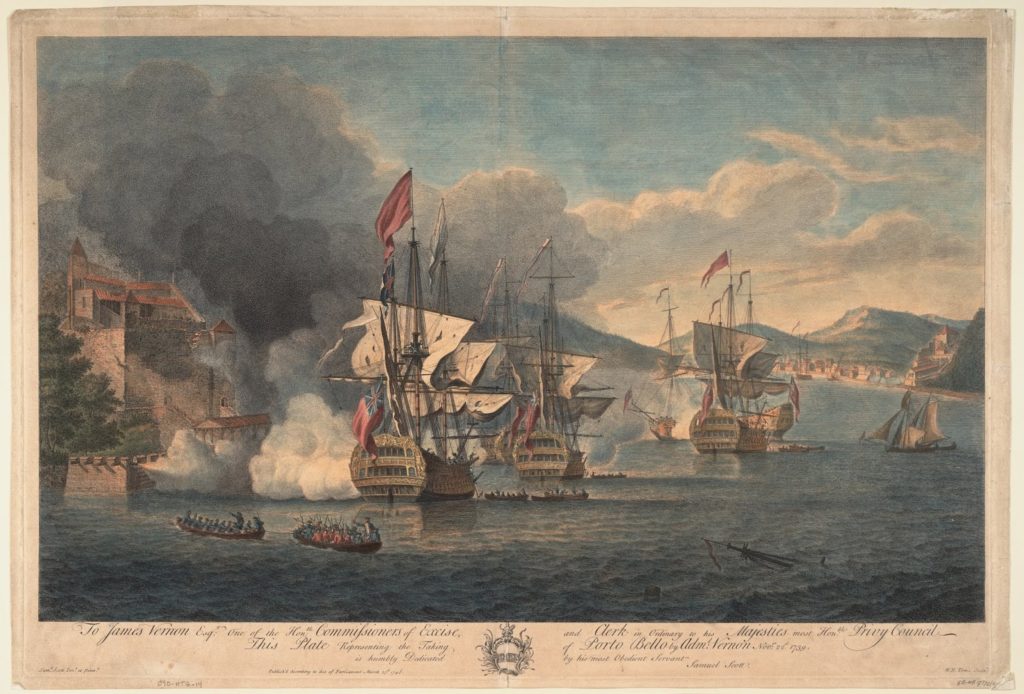In April 1731 the British brig Rebecca was sailing, probably not far from La Havana, when a Spanish guardacostas stopped and boarded it looking for smuggled goods. It is not clear what really happened on board and at the moment it seemed a trifling event. But seven years later, in 1738, the Rebecca’s Captain Robert Jenkins exhibited to a committee of the House of Commons his own left ear, cut off by the Spanish that – he said – also pillaged the ship and insulted the British King. British public opinion was already angry with Spain for other “outrages” on British ships and war began in October 1739, later called “War of Jenkins’ ear”.

A large British fleet set sail for the West Indies under the command of Vice Admiral Edward Vernon, who became a national hero thanks to the conquest of the important Spanish town of Portobello, on the Atlantic coast of what is now Panama. Later on things didn’t go so well for him, but this is a matter of no interest to us now. For every rum enthusiast, his lasting fame is due to the invention of Grog.
At that time, in the West Indies a daily distribution of rum as an alternative to beer was already quite normal. Sailors usually drank it pure, all the allowance down in one gulp. It was a very dangerous practice, the cause of many accidents in the rigging at sea and also of many problems of discipline. We must not forget that at that time the alcoholic strength of rum was probably much higher than what we are used to today. In any case on board British warships accidents, disease and harsh punishments, also caused by rum, ravaged the crews, often more harshly than enemy weapons.
Worried about the health of the sailors and the efficiency of the fleet, Vernon tackled the problem head on. First of all he consulted the captains and the surgeons of his fleet, then on August 21st, 1740, he signed a General Order that deserves to be widely quoted:
“Whereas it manifestly appears … to be the unanimous opinion of both Captains and Surgeons, that the pernicious custom of the seamen drinking their allowance of rum in drams, and often at once, is attended with many fatal effects to their morals as well to their health, which are visibly impaired thereby, and many of their lives shortened by it, besides the ill consequences arising from stupefying their rational qualities, which makes them heedlessly slaves to every passion;
[ I order the Captains]
… to take particular care that rum be no more served in specie to any of the ship’s company under your command, but the respective daily allowance of half a pint a man for all your officers and ship’s company, be every day mixed with the proportion of a quart of water to every half pint of rum, to be mixed in scuttled butt kept for that purpose, and to be done upon deck, and in the presence of the Lieutenant of the Watch, who is to take particular care to see that the men are not defrauded in having their full allowance of rum, and when so mixed it is to be served to them in two servings in the day, the one between the hours of 10 and 12 in the morning, and the other between 4 and 6 in the afternoon.”
Praise be given to those who invented the metric system. The history of systems of measurements before it was adopted, and in Britain and the US even afterwards, is a real quagmire. With the added complexity that in the past units of measures often changed name and dimensions depending on the content (for example, liquids or grain), the Country and the years. In addition to that, pre-industrial production techniques were not able to manufacture standard barrels, always of the same dimensions.
Luckily, it is enough for us to know that “a quart” was the fourth part of a gallon, roughly 1 liter, and half a pint was about a quarter of a liter. Therefore, the new beverage had roughly 1 part of rum for 4 parts of water. Sailors did not like such a novelty, they wanted to get drunk with real rum, not to drink it watered. But discipline was cast-iron and they had to accept it. Drunkenness on board did not disappear, but it decreased significantly and so did accidents and punishments. In summary, the innovation was a success.
At the beginning the order applied only to the fleet commanded by Vernon, but after a while the Admiralty extended the same rules to the whole Navy. Then, over time the allowance decreased and was distributed only once a day, creating one of the most impressive, enduring, typical, and frankly astounding, rituals of the Royal Navy. Usually called Up Spirits and also simply Tot, it lasted for 200 years, as we will see in future articles.
The new beverage had no name, but with their traditional flair for names, sailors soon gave it one. Vernon’s nickname was “Old Grogram” from a waterproof cloak he usually wore, made of a fabric called Grogram.
So his drink was called “Grog”.


Your arguments should be seen as the standard when discussing this topic.
There are no words to show my appreciation!